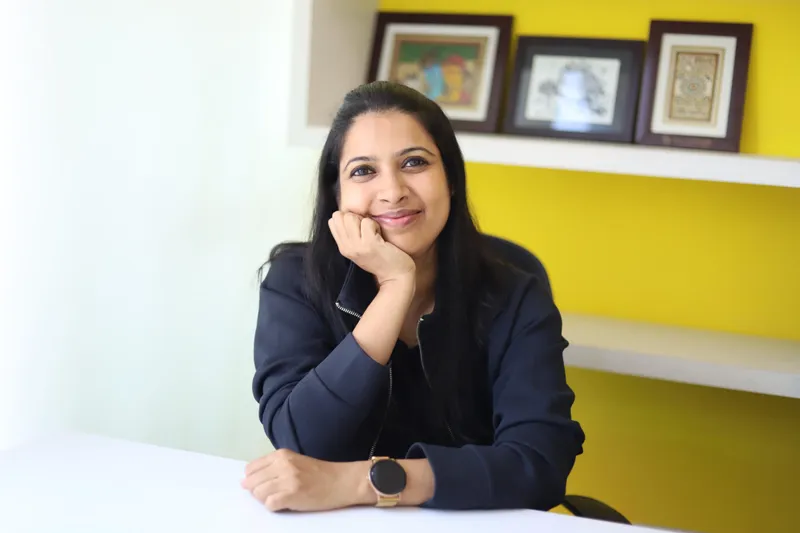[100 Emerging Women Leaders] How Richa Singh took her emotional wellness platform YourDOST to newer heights
For the past decade, emotional wellness platform YourDost has impacted over 30 lakh people and saved over 12,000 lives through its comprehensive range of mental health programmes. Its co-founder Richa Singh reflects on her journey.
In 2015, YourDOST was among the first platforms in the country dedicated to mental health and well-being.
Nearly a decade later, its consistent and 360-degree approach to emotional wellness has impacted more than 30 lakh people and saved 12,000 lives, according to Co-founder and CEO, Richa Singh.

Richa Singh
Singh’s journey into the mental health space was influenced by her personal experiences. Growing up in Bhopal, she stayed in Kota for a few months to prepare for her IIT-JEE entrance exams. She observed how her classmates and many other students struggled with pressure. This experience led her to return home and prepare on her own.
In 2008, during her final year at IIT Guwahati, just before the placement season, Singh’s friend took her own life.
This incident made her realise the immense pressure that students go through. It also highlighted the stigma surrounding mental health and the difficulty people have in seeking help.
“We had counsellors, psychologists, and psychiatrists on campus. But I guess students felt that if we consulted them, we would be labelled as crazy. We had to deal with pressure on our own. But after my friend died by suicide, I began thinking what I could have done differently to may be save her or a lot of people before things got severe,” she recalls.
After completing her course, Singh joined a hedge fund startup, and later worked in the US and Germany. Even in corporate organisations with established support systems, she noticed that people were not talking about mental health. This intrigued her, especially when many employees had access to professional support, including counselling services, but few availed of it.
She quit her job in 2014 and look at building a startup that would work at the intersection of technology and psychology. Along with her friend, Puneet Manuja, she put together YourDOST in 2015 that initially offered free counselling by experts.
“A lot of people reached out for support and we ran it free for almost three years. Counsellors also joined us, and then it struck us that if we had to scale, we needed to support more people and pay the team. We raised our first round of funding from angel investors in 2015. Elevation Capital funded us in 2016,” she says.
The founders decided it was time to put a business model in place. They looked at educational institutions and ran a pilot programme at IIT Madras in 2016.
“Earlier, if we saw ‘X’ people seeking support, when it became online and was available 24x7 and anonymously, 10X people were reaching out for support. We became one of the first startups to offer mental health online,” she adds.
Around that time, it also launched a premium model for individual clients where they could have a few free sessions and pay for the later ones.
Pivoting to a new model
But unfortunately, Richa points out, the critical mass was still not ready to pay. YourDOST then pivoted to a B2B model, working with educational institutions like IITs, IIMs, and others. But when the pandemic hit, work with educational institutions took an uncertain turn.
However, a lot of corporate organisations reached out for employee support.
“Hybrid working was new for them. It was a trying time with people losing their loved ones to the virus. A lot of startups also reached out for help,” she says.
It’s heartening to see forward-looking companies look at wellness beyond an HR activity, she says. YourDOST currently works with over 500 organisations, including corporates and colleges.
“We do a lot of customisation, according to the nature of the organisation, its location, or the type of employees. If organisations have more women going through stress, we have programmes for that. If they are in the maternity phase or young parents juggling work and parenthood,” she explains.
It also supports companies through retrenchment and reorganisation, offers sensitisation and training programmes for managers, and more. Apart from these, it also offers regular mental health support.
Leadership training also involves top leaders in the process and creating an environment and talking about mental health is a good strategy for any organisation.
Psychological challenges of founders
Recently, YourDOST released its first-of-its-kind report, “Emotional well-being of entrepreneurs”, based on insights from over 200 entrepreneurs on psychological challenges by founders.
“54% of founders said that they wake up to stress, anxiety, worry, and helplessness almost daily. 37% of the founders are dissatisfied with their journey. One out of every three entrepreneurs also mentioned that they sacrifice their work-life balance for business success and growth,” she elaborates on the findings. YourDOST has a specialised programme for founders to support them in their journeys.
“We have just touched 30 lakh people. I think there are more people and organisations to be impacted and founders to work with,” she adds.
Self-belief is an important part of an entrepreneur’s life, reiterates Singh. What would her advice be to other aspiring women entrepreneurs?
“Everything starts with us, it’s the power of the hand! Secondly, we should have role models that only inspire us, but illuminate the path not seen by us,” she concludes.
Edited by Megha Reddy


![[100 Emerging Women Leaders] How Richa Singh took her emotional wellness platform YourDOST to newer heights](https://images.yourstory.com/cs/4/8e7cc4102d6c11e9aa979329348d4c3e/100EWLRichaSinghFeatureImage1-1734402600275.jpg?mode=crop&crop=faces&ar=16%3A9&format=auto&w=1920&q=75)




